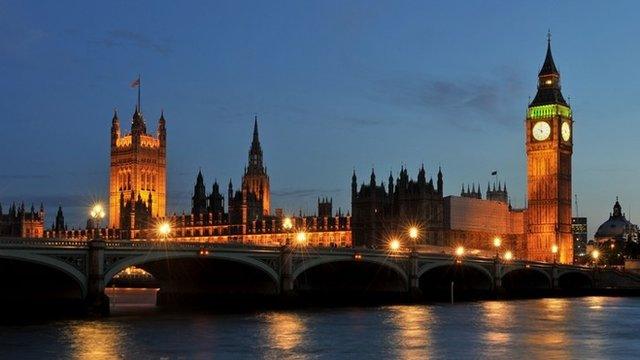Tory MPs at odds over English votes for English laws
- Published
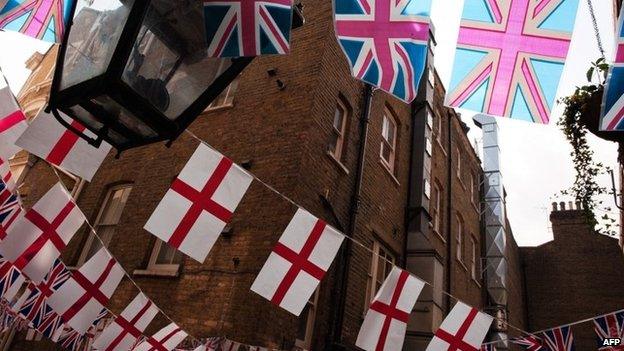
Many Conservative backbenchers want a separate English Parliament
WARNING: this blog contains constitutional stuff that can be complicated but does matter.
Along the corridors of Westminster a faint murmur of grumbling can be heard, a sound that for now is sotto voce but could soon explode into the open.
Conservative MPs have in recent weeks maintained discipline and kept friendly fire on their leadership to a minimum.
But soon, David Cameron will have to announce his plans to give English MPs a vote over English laws - and beneath the surface a ferocious debate is raging.
The latest contribution comes from respected senior Conservative Andrew Tyrie, chairman of the Commons Treasury Committee and longstanding constitutional reformer.
He has emailed a 48-page document to all of his Tory colleagues, entitled "Voice and Veto - Answering the West Lothian Question", which argues strongly for English MPs to have a veto over English legislation in the House of Commons.
'Unnecessarily disruptive'
For aficionados, this is option three in the command paper published in December by the leader of the Commons, William Hague.
This option would allow MPs from all over the United Kingdom to debate and vote at the second reading, report and third reading stages of legislation that affects just England.
But crucially, it would also allow English MPs alone to debate and vote on the detail of the bill during the committee stage. English MPs would also have a decisive veto - through what is known as a legislative consent motion - before the bill gets its third reading.
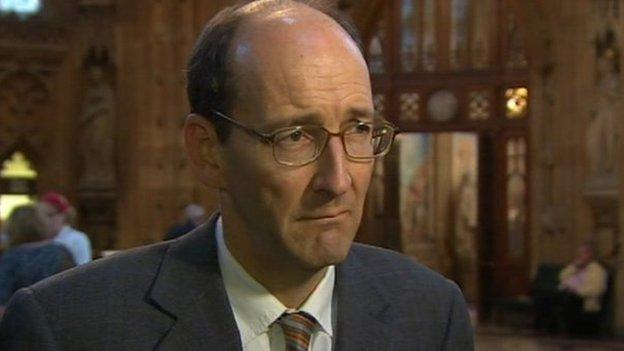
Mr Tyrie says an English Parliament would risk jeopardising the union
The key point is that this option would give English MPs a much greater say over English legislation than they currently have. But MPs from all over the UK would still retain a say over English laws.
Mr Tyrie says that option three "would be a stronger demonstration that Parliament was giving English concerns and interests their proper place in its work; on grounds of visibility and hence capacity to secure consent, it is preferable".
He also opposes plans for English MPs to have an absolute monopoly over English legislation, saying "an English Parliament would be unnecessarily disruptive to the Union. It would risk jeopardising, rather than bolstering it. A 'full-strength' version of English Votes for English Laws could run many of the same risks."
Purists v moderates
William Hague may sympathise with Mr Tyrie's proposal - we shall have to wait and see - but other Conservative MPs do not. They want option one from the Command Paper which would give English MPs total control over English legislation.
They fear that anything less than that will be seen as a betrayal of the promise the prime minister made outside Downing Street last September the morning after the Scotland referendum result.
Just to remind you, this is what Mr Cameron said: "We have heard the voice of Scotland - and now the millions of voices of England must also be heard. The question of English votes for English laws - the so-called West Lothian question - requires a decisive answer.
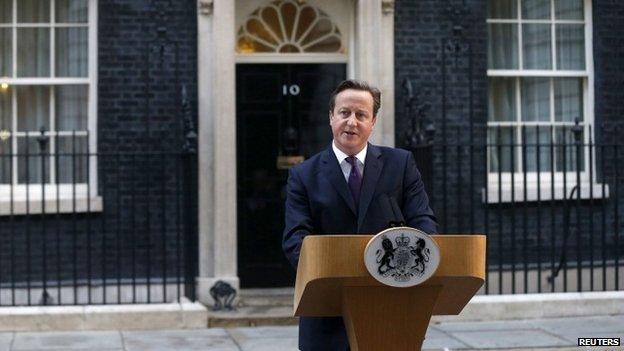
Mr Cameron announced last September that he wanted English MPs to have a greater say over England-only legislation
"So, just as Scotland will vote separately in the Scottish Parliament on their issues of tax, spending and welfare so too England, as well as Wales and Northern Ireland, should be able to vote on these issues and all this must take place in tandem with, and at the same pace as, the settlement for Scotland."
The Conservative purists say that Mr Tyrie's option three does not fulfil that promise. They say that although it gives a veto to English MPs over English legislation, it also gives a similar veto to the UK Parliament. To be precise, if the whole of the House of Commons opposes what the English MPs have got up to by themselves during committee stage, then all MPs can reject the whole caboodle at report stage.
So for the purists, option three gives still too much power to the non-English MPs and will therefore not satisfy what they see as the growing English sentiment that, unless satisfied, will add to tensions within the United Kingdom.
They say it will also disempower Tory MPs in marginal seats who need everything they can lay their hands on to counter the threat of UKIP. Under their breath, some MPs are saying anything other than option one would give the same impression of betrayal felt by Conservative-minded voters who thought they had been promised a referendum on the Lisbon Treaty before the last election.
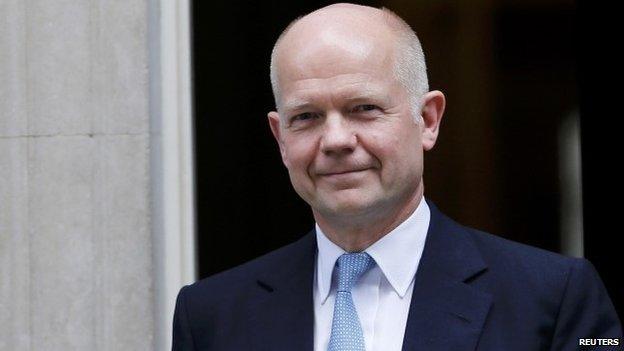
Mr Hague chaired a committee to examine the role of English MPs in Parliament - which Labour boycotted
The moderates push back, saying that giving complete control to all English MPs would effectively create an English Parliament, leave the UK government with diddly-squat to do, and unnecessarily antagonise the Scots. They also say that English MPs simply cannot have the same powers that Scots MSPs have over Scottish matters because England is too big and powerful.
The purists respond that English votes for English laws has to be simple and clear or it will not calm the fears of English voters who are increasingly worried by SNP threats to break their usual custom and vote on English affairs in the next parliament.
For now this debate continues below the radar. But once Mr Hague publishes his plans, the discussion will spill out into the open air.
At a recent meeting of the 1922 committee of backbench Conservative MPs many were in favour of the purist option one.
They have circulated to all Tory MPs a paper from their own champion, the constitutional expert Lord Norton of Louth. They talk now not of EVEL (English votes for English laws) but EVEI (English votes for English issues) and EVEN (English votes for English needs).
This debate is getting more complicated and it could be about to get more bloody.
- Published21 January 2015
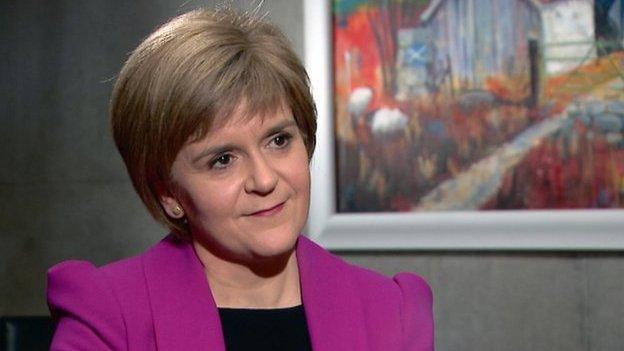
- Published3 February 2015
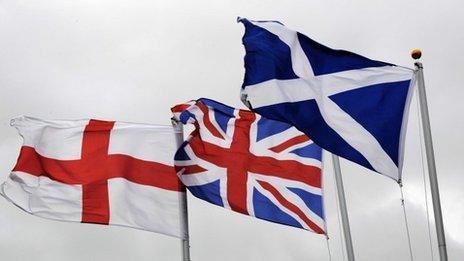
- Published16 December 2014
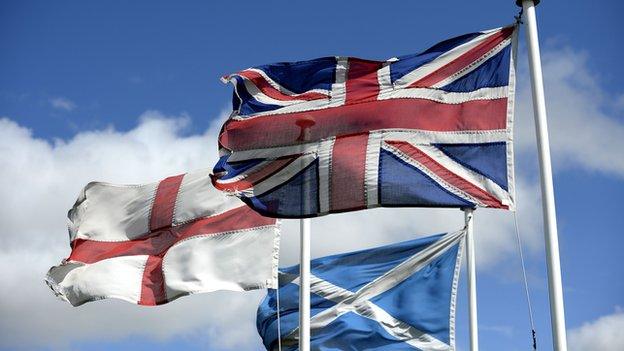
- Published14 October 2014
